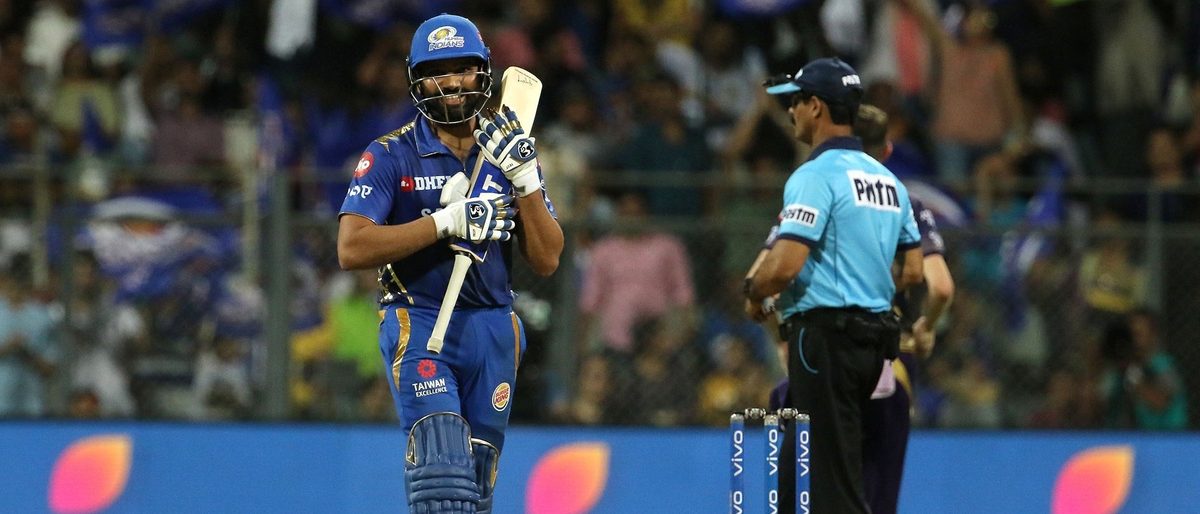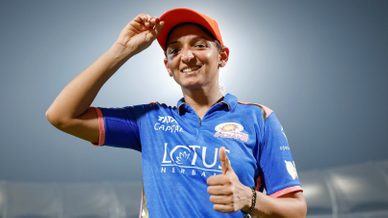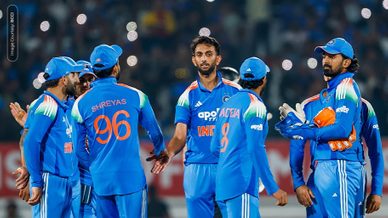
Rohit: World Cup is my ultimate dream
Rohit ‘Hitman’ Sharma. One name at the top of India’s batting order that will hold key to India’s chances at the upcoming ICC Cricket World Cup.
Rohit has time and again mentioned about the way he’s been hitting the ball. The Mumbai Indians skipper struck form at the business end of the tournament and is looking forward to carry his touch on English soil.
Rohit Sharma scored 330 runs in 8 matches at the 2015 Cricket World Cup and averaged 47.14. The prolific right-hander is also one of the only two Indians to have scored a World Cup hundred in a knockout game. Rohit struck 137 against Bangladesh in the Quarter-final of the last World Cup.
Ahead of his second ICC Cricket World Cup, Rohit Sharma spoke to cricbuzz.com.
Excerpts from the interview:
Q: What does this World Cup mean to you? Do you see it as that ultimate prize in the game you need to play for?
R: It's the ultimate dream. Any kid growing up begins to nurture dreams in whatever sphere of life he or she aspires for. As a cricketer, growing up, the idea of playing in a World Cup, to be part of that team, to win it - that's the fairytale every youngster grows up dreaming about. Mine was just that kind of dream too.
Q: And in 2011, you weren't...
R: Yes, and nothing hurts me more.
Q: At this level, you need to have a certain level of desperation to succeed. It's almost like an antithesis to what a cricketer otherwise wants to pursue - patience.
R: Look, there's a balance one has to draw between the kind of desperation that exists within you and the calmness you seek if you've got to keep playing this game at the highest level. Calmness is what I need. Not desperation.
Q: There has to be some bit of desperation to achieve targets like World Cup. Yet, one needs to be patient. What's your take?
R: At this point in time, calmness is what I need. Not desperation. Because I've played my share of cricket to realise this is what works for me. Every time I have shown signs of desperation, I've moved away from my plans. It has happened to me many times. Not being in the right frame of mind, not being in the right kind of form - and desperation has crept in. Different things work for different people.
Q: So you're saying this is a very different Rohit Sharma from who we've known...
R: One hundred per cent, yes. The years have changed me.
Q: How has parenthood changed you? You have to get used to new sleep patterns and alter gym and net timings...
R: (Laughs) Tell me about it. You don't get to sleep at all. So, you see life keeps changing for the better. I'm not sleeping the way I used to, but I'm happy about it.
Q: There are players who tell me it's always easy speaking with Rohit Sharma, opening up to him. You seem to give them the confidence to speak their mind...
R: I've always been a listener. The kind of person I am, I wouldn't have evolved one bit if that wasn't the case. There's no harm in listening to people - even if the person you're listening to has just about started playing the game. Let's get one thing straight here: You can never say you're the wisest. Because, that'll never be the case. I love opinions. In the end, it's up to you to decide what you want to make of those opinions.
Q: You need to avoid unwanted gyaan
R: Listen to people, day in, day out, it's something that I have learnt to live with - you step out of the house and the first guy you say hello to, hellos back: "Cover drive thoda aisa khel na. Straight drive sudhaar apna (play the cover drive like this. Improve your straight drive)". Kya karoon? (What do I do). Listen and move on. One guy, I don't even know him, gave me a 15-minute lecture on the pull shot. Don't hit the ball in the air (laughs).
Q: That gyaan also comes your way because they want you to do well...
R: Yes. What those people don't understand is they know and recognize me as a cricketer because of those very shots. I wouldn't have been scoring the kind of runs I did if I didn't take those risks. For instance, just this week, someone shared an interesting stat with me. Post the 2015 World Cup, I've hit 130 sixes. The next best from India is 55. The margin of 75, you see, is the margin of risk I've taken. Simple.
Q: Scores of people admit they'll pay handsomely to watch you bat for hours. But there's another side to you too. On days, when things don't go your way, you appear almost absolutely uninterested, completely dispassionate...
R: I don't like to show emotions. I understand being on television all the time or being in front of large crowds, there's an unending appetite, demand from fans. You sometimes do justice to it, other times, you get unlucky. In my case, either way, I don't show what's going on inside me. I just go about my job. For people to think and talk in that fashion is quite obvious. They feel concerned because they feel invested in you. Come to think of it, that's a great feeling. But with due respect, the fact also remains that they don't really know the real me. What I'd like to share here is that I treat every opportunity (I get) the same, set the same goal. When you lose out on an opportunity, of course, you feel disappointed. That goes for anyone. Whether I'm being seen as someone who's letting the world know how disappointed I am, at that moment, is irrelevant. What's important is to make the right use of the next opportunity.
Q: The same goes for your teammates?
R: The thing is, this dressing room knows exactly what it is trying to achieve. Outsiders don't. This is exactly what I kept telling my players, the support staff and everybody at Mumbai Indians. Doesn't matter where you play, who the opposition is, what they say, how they go about with their strategy. What matters is how we, as a team, go about our roles, believe in what we're playing for. On that note, it is important to have that shield around yourself, not allow outside interference when your goal is set. It helps. After you've finished playing some amount of international cricket, you get a fair idea of what works and what doesn't. What's an experience all about, otherwise?
Q: The way you construct your innings is quite a reverse order of how the rest of the world does. And yet, it has worked better for you than most. You take your time to settle down in an innings...
R: What works for me is what works for me. I'm going to stick to my plans. In those double hundreds that I have scored, you've got to see how many balls I had consumed by the time I reached my first 10 runs, the first 50 runs, the first 75-80 runs. It'll rarely be five balls 10 runs or 25 balls 50 runs. You know what I'm saying - but I've still got there. I've worked with certain trends and those trends have worked for me, in return. There will be days when I will get off to a flyer.
Obviously, when you're chasing scores of 350 and 370, you'll have to change gears as required. There's not much time that one can take before he can get going. I get that. But you asked me about how I like to go about - to that, I'll say, follow what suits you, go by the conditions, the opponents, the kind of attack that's coming at you. So, let's say much of that is an instinctive factor.
Q: You've spent the last two months with your MI teammates Hardik Pandya and Jasprit Bumrah more than any other senior member of this Indian team. Both are absolutely vital to India's campaign...
R: They've been shaping up well. Both are heading into their first World Cup. Both are cricketers with positive mindsets. They love a challenge when presented with one. All of that along with the performances they've had in the last few months - it augurs well. The good thing about both of them is they constantly want to improve, want to be in the middle of the action. Hardik played some crucial knocks this IPL. He's someone who's always looking to contribute in some capacity.
Q: Do you like to face Bumrah in the nets...
R: Do I have a choice? Every second, third day, I'm facing him in the nets. He's even more dangerous in the close nets, because of his action. You actually want to face him in the open nets. He's difficult to read, and then that pace he can whip up. He's very different, very special.
Q: Summers in England can be tricky. Last year was hot. This year appears to be the same. 2013 was all windy and overcast...
R: Weather is something we have been looking forward to. If it's anything like the last summer that England saw, it's going to be a treat for batsmen. In 2013, it was mostly overcast. Some matches got washed away. In fact, if you look at the series between England and Pakistan, it was hot out there. Last year, when we were there, it was quite hot. One good thing we have done as a team is pick players in terms of what conditions we're likely to face in England. The wrist spinners can come in handy. There's pace at our disposal. Batsmen who've got the necessary experience. I think we have the guys to do the job.
Q: India enjoys a fabulous attack...
R: Virat has plenty of options to choose from. He's got full-time off-spinners, parttime off-spinners, he has medium-pace options, three quicks, left-arm options. The attack that we have is probably the best we could've picked.
Q: You think India's missing a game-changer in the middle order, other than Virat at No. 3?
R: I think we have that component, should we need it. But let me put it this way - that onus lies on the top 3. Between me, Shikhar and Virat, it is our job to get that going. Between the three of us, we want to keep doing this as consistently as we can. It's not like maine kal banaya, aaj tu bana (I scored yesterday, today you do it). The onus will be on us.





